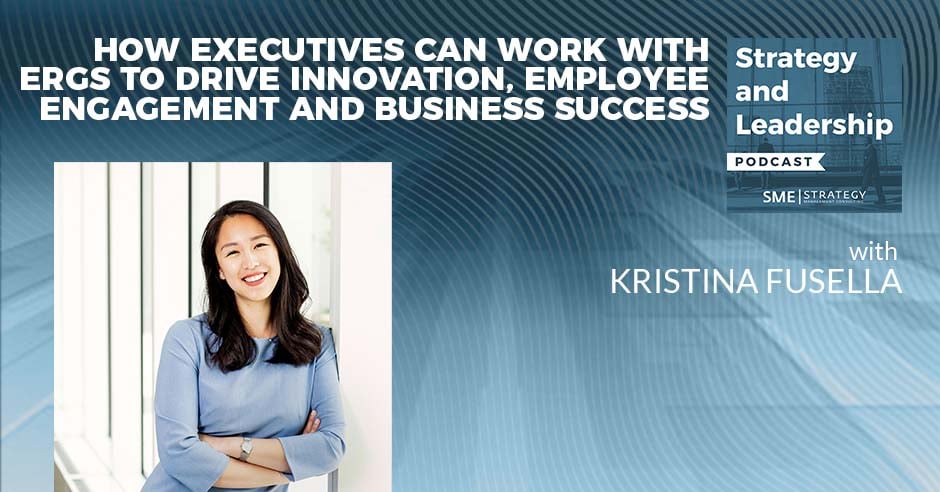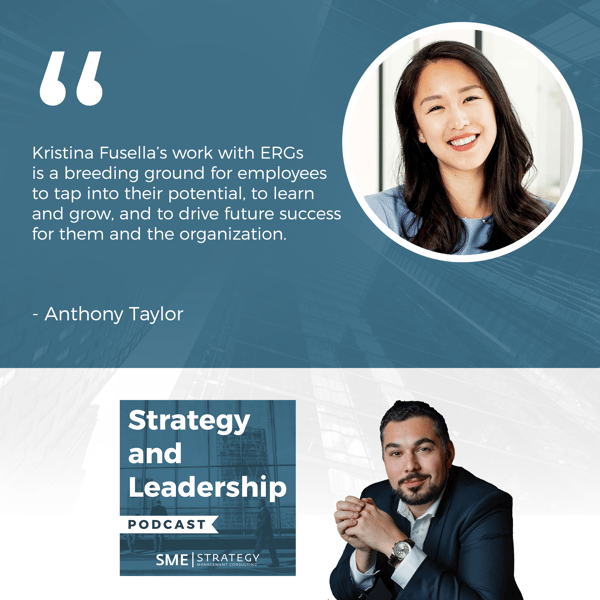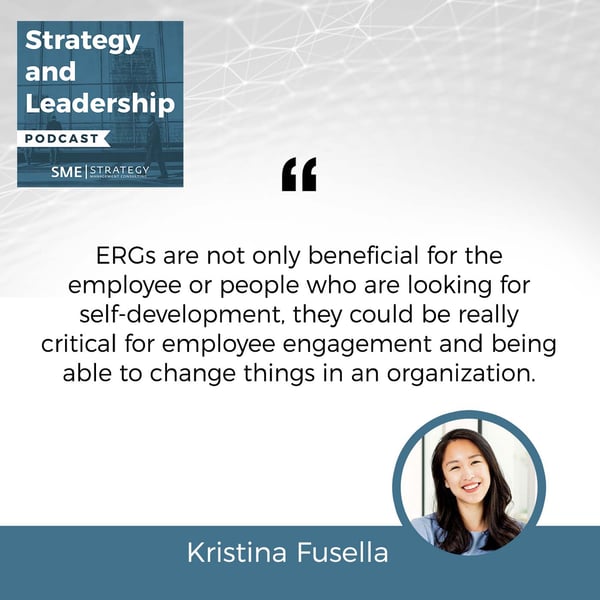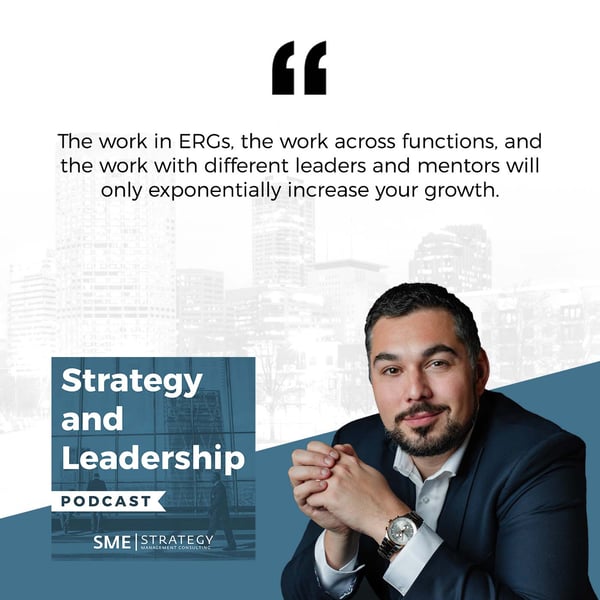Working With ERGs to Drive Innovation, Engagement & Business Success

Your greatest asset is your people; investing in them is also investing in your growth. In this episode, Anthony Taylor interviews Kristina Fusella about the value of working with Employee Resource Groups (ERGs) to drive innovation, employee engagement, and business success. Kristina is the Senior Director of Capabilities and Employee Experience at Novo Nordisk, and she takes us through her non-traditional career path and the work she is doing. She also dives deep into the role of ERGs in employee development and organizational culture, especially in terms of networking, mentorship, and personal development. With her insights on taking on new challenges and building a broad skill set, Kristina provides us a conversation that highlights the importance of creating a supportive and inclusive culture that encourages employees to explore new opportunities and contribute to the organization's success. Tune in now and embrace exponential growth for you, your team, and your business.
Want to continue the conversation with other leaders around the world? Join our Strategy and Leadership community.
https://strategy-and-leadership.mn.co/
► Subscribe to our channel for weekly videos on strategy & leadership: https://www.youtube.com/channel/UCOHLNRrpk3rGUdg7qUQjiog/?sub_confirmation=1
➡️ Looking for a sample agenda for your strategic planning offsite? https://www.smestrategy.net/blog/sample-strategic-planning-agenda
// Connect with us:
► Contact us: https://www.smestrategy.net/contact
► Connect with Anthony on LinkedIn: https://www.linkedin.com/in/anthonyctaylor604/
// About SME STRATEGY CONSULTING:
SME Strategy is a management consulting firm that specializes in helping organizations develop and implement their strategic plans. We work with teams to facilitate conversations about strategic direction and business strategy so that our clients can focus their energy on what will move them forward faster.
► Work with us: Are you looking for someone to facilitate your strategic planning process? https://www.smestrategy.net/strategic-planning-facilitator
► Check out our Strategy & Leadership Podcast: https://open.spotify.com/show/4yND4JKofh64gcvyvcLMqW
► Check out our online course on how to successfully lead your next strategic planning process: https://courses.smestrategy.net/
Listen on Spotify: https://open.spotify.com/episode/2FfDbhF6tHzX2sPcAYsniz?si=84d6ab0c6f284cd5
Listen on Apple Podcasts: https://podcasts.apple.com/ca/podcast/how-executives-can-work-with-ergs-to-drive-innovation/id1202449526?i=1000648062479
---
Watch the episode here
Listen to the podcast here
How Executives Can Work With ERGs To Drive Innovation, Employee Engagement And Business Success With Kristina Fusella
My guest in this episode is Kristina Fusella, who is the Senior Director of Capabilities and Employee Experience at Novo Nordisk. Kristina, how's it going?
You are spot on, Anthony. I'm doing well. How are you doing?
I am awesome now talking to you. I wasn't doing awesome yesterday, but I'm excited to chat. I'm excited to hear about your experience. I am excited to hear about your non-traditional career path and the work that you're doing. Why don't you give our listeners a little bit more about you and how you got here and we'll get into it.
Thank you so much for having me. It's a real pleasure to be here and talking to this audience. As Anthony said, my current title is the Senior Director of Capabilities and Employee Experience. I'm hesitating a little bit because I'm not used to saying that. I'm on a one-year rotation into this role. It’s a pretty bold move because I have absolutely no background in capabilities or anything related to this job function. It's part of my wish to build a wide breadth of experiences and push myself to take some bold moves in my career to gain exponential learning out of it.
I'm an analytics person by background. I'm an engineer by training. I graduated with a degree in engineering. I started my career in consulting at IBM. It’s very broad and narrowed into the pharmaceutical industry. I found Novo Nordisk because I simply love the culture and I love the mission and purpose of this company it sounds a little bit unrealistic but I will say when we were named Top Best Places to Work Internationally and Worldwide, I do feel that.

As an employee, it's a great culture. I joined Novo a few years ago in an analytics role and had the pleasure of moving into different types of roles since then. I was able to take a leap in my career. The first one was from an analytics role into a sales function to broaden my experiences in the commercial space. I was pretty crazy going from someone who sits behind the computer typically all day to someone who's out in the field talking to people all day and trying to sell products. Also, answer questions and be the face of the organization for those people. That gave me the confidence to try a little bit of other things and to take bigger leaps of faith.
From there, I was able to jump into a purely commercial role in a department called Market Access. I did payer and employer marketing. From there, I was the Chief of Staff to our Head of Strategy and Rare Disease. Focusing on future business strategy and where this organization is heading in the next few years and charting that future. It’s cool times.
All along the way, I'm a huge advocate of employee resource groups. I co-led the Millennials ERG is what we call them way back from 2018 to 2019. I learned a lot from that experience. Now, I am the co-lead of Women in Novo Nordisk, which is our largest employee resource group of over 2,000 members in the US. That's a little bit about me. My windy career path and my jungle gym as I call it. I'm still figuring it out.
>> Doing strategic planning in the near future? Learn how a strategic planning facilitator can help align your team, guide the meeting with expertise, and help you reach your goals faster.
Talking about Novo a little bit in terms of the culture of the organization to be supportive and to make that happen, what I see is either you switch companies to make a move in your career and that's hard enough. It sounds like this culture is supportive of having the right people in the right roles and a seize-like breadth as a strength. Is that fair to say?
That is fair to say and it wasn't always like that. That's part of the reason why I love this company so much now. When I first started here at Novo, I spent the first four years in my analytics role. I felt quite a bit pigeonholed into that career path even though for a while, I have been trying to express my interest in a different job with a different function. We didn't have any mechanisms to allow employees to do that. We had pretty strict job descriptions.
For example, if you wanted to move into a marketing role, for example, you needed 5 to 6 years of experience in marketing specifically, otherwise, your resume wouldn't even be considered. That was certainly my experience earlier on but through the employee resource groups and by being such a listening company, I would say a lot of that feedback came was elevated from employees. My situation was an N of 1, but there were others who felt a similar situation where their transferable skills weren't being recognized to be able to move into different roles.
That was also limiting some of the potential of our employees in general. In the last four years, the company has opened up and more recently very aggressively allowed for these very bold job swaps. For example, the one that I'm currently in now and that all came out of employee feedback. It was a journey to get here, but it was super cool to see it come to fruition.
I'd love to hear more about employee resource groups and what they mean at Novo. Also, to put a bit of context in that. When we talk to CEOs and business leaders, a lot of them have never done this before. They might have been the CEO of their company, their presidents, and even if they have an HR director or people director or heck for any function, they're as good as the experience they have and they're as good as the experience that they can access.
Employee Resource Groups (ERGs)
What I think is neat about ERGs, and the little I know of them, is an opportunity to tap into greater experience, a greater depth of knowledge without being. I don't want to use the word cumbersome, but I also don't want to use the word formulaic. It's not like, “Let's do a pulse survey, and let's see what people want.” It's like a lot more quality while also allowing employees to step into it. That's my view on it. How would you describe ERGs? Maybe you can give us a little bit of insight into how they're run and what your experience has been with them.
I like what you said about getting to quality because it's essentially getting closer to the people listening to them. The beauty about ERG is I think you could be any size of a company to do it very well. I'll tell you a little bit about my experience at Novo. I think in a lot of companies I've been in previously, there's always these special interest groups, whether they're employee formed or they're more formally company sponsored.
ERGs are essentially for getting closer to the people and listening to them. The beauty about them is you could be any size of a company to do it very well.
You'll have groups of people gather around together just by nature of having an interest together. At Novo Nordisk, we have many different groups and the ones that I have experienced are our Millennials organization, which has since been rebranded to emerge to more focus on emerging talent rather than a certain generation of talent. The Asian Pacific Islander Pacific ERG comes from Chinese descent myself and then women in Nova Nordisk, which is the one I co-lead.
These are groups that I think can easily be mistakenly seen as social clubs. It's a bunch of people networking and especially what I found with the Asian Pacific Islander Group gather around more celebrations based off of the culture. I think those are fun celebrations, but they're also important because you're spreading cultural awareness and in the world of promoting diversity, inclusion, equity, and belonging, those are also very critical as well.
The work that I more strategically would encourage people to think about with ERG is how you could tap into this employee population as a resource. That can happen in a couple of different ways. One way is, to me, this is a perfect breeding ground for talent. When you have a structure like an ERG, it means someone has taken on the lead or some group of people has taken on the lead to make it run and make it happen.
You're talking about leadership without maybe formal authority. Maybe you have a leader who has, and because everybody has a day job, this is someone who is inspiring and motivating people to dedicate time outside of their day job of responsibilities to take on some work and/or take on an initiative. All of these skill sets are a breeding ground for people who have future potential for this company. To me, it's a safe sandbox for them to test and learn. Also, fail a couple of times and totally not harm anything in terms of company revenue or anything extremely important to the running of an organization.
For example, my first whole lead of an ERG, I would say, was with the Millennials Group and I had to experience how to give feedback to people and how to coach people. There are some that totally drop the ball and how do you get them to either performance management or convince them to keep on going? Those are things that I had to deal with, which I absolutely 100% tell you that I did not do very well but that was my first time leading a group of people. I was very happy reflecting on my experience. I did it in a safe space like an ERG. I didn't ruin anybody's career. I didn't hurt anything in the company, but was able to practice those. When the stakes are higher, I wouldn't make the same mistakes.
I think that's one of the things that comes out loud and clear you're allowing somebody in it. It's like a training ground. That's learning and development like training so you can get better. As you practice in a low-stakes, lower-stakes arena, it's an opportunity. Whether it's the emerging leaders or another subgroup, an opportunity to build that experience within the organization. I did have a question because you said outside of the day job. Does that mean that it is beyond your nine to five or is it akin to maybe not a secondment, but some of your working hours are able to be dedicated to the ERG?
My recommendation to everyone, and I say this to anyone who joins the core team of an ERG that I lead, is for it to be successful, it should be done during working hours. Development should always be done during working hours. This is not about asking someone to burn the midnight oil for an effort that may or may not be rewarded at the end of the year.
For ERGs to be successful, development should always be done during working hours.
When we think about people development at Novo Nordisk, we have this 70/20/10 rule or 70% of your learning and development happens on the job. It’s experiential or what you're learning day to day. Twenty percent of it should be doing something else, either cross-mentoring, coaching, or learning from other people in a different group like an ERG. Also, you're being around different people across the organization and being exposed to different things.
The 10% is more maybe formal classroom learning or taking courses online. I ascribe to that when I lead my team. Seventy percent of the rule, you have things to deliver on your day job and you're learning on the fly, but encouraging people to carve out that time to make space for their own development. That's inclusive of taking on a leadership role or leading initiatives within an ERG.
Culture And Career Development At Novo Nordisk
One of the things that comes up with SMEs at least and in all businesses is that our employees need to do their day job. They're so busy. When are they going to have time to do other stuff? One, it sounds like it is a commitment of the organization to do that. I would also imagine it's understood by your peers and your managers to say, “We all share that 7D 2010 expectation, or at least the understanding of your working week. Eight hours of it is going to be spent doing ERG or other activities that'll support your own development and ultimately, make you better and more effective in that other 28 hours. Is that reasonable?
Yes. I think getting that support from your leadership is critical. The other thing I would say is that this is not only beneficial for the employee or people who are looking for self-development too. The ERGs can be critical for employee engagement and being able to change things in an organization. My secondary experience with ERGs is that this is a group that represents a diverse population and you have a responsibility to represent the voices of that population.

For the ERGs, for example, in Women in Novo Nordisk, one thing that we are running is an insights work. It’s like market research or deep research into understanding the person's voice and the perspectives of our group. I think women have a very strong career track in this organization. I don't think there are any real glass ceilings that I could perceive, but there are some things that are holding women back.
What are those things that are preventing people from maximizing their potential at work? This is a study that I had commissioned to deeply understand from our membership, all anonymous, what are those things that we need to change within our culture or within ourselves or what can we as an ERG do to help? Also, what can the organization do to help change so that we remove barriers for this demographic at work?
That was powerful for our executive team to see and understand because when you have certain decisions that you're making around the table, you may not have all the diverse perspectives and it allows this company to have a better environment for people. To me it's, it's a win-win for all different parties to promote these ERGs. Certainly, for the individuals who can get a lot of personal development out of it, but also for the executives who are planning their future workforce. How do you make this company a place that people want to stay at for years?
Benefits Of ERGs For Employee Engagement And Organizational Development
That was what I was going to ask you next about the Women in Novo ERG because with 2,000 people in it, obviously not everybody is leading it and looking at the participation and the mental heuristic of like, “This is not a committee.” When the committee is designed to get together and potentially solve or work on a problem, this is more of a population and a way of including folks who understand their needs. I guess what would be the difference between somebody who participates in an ERG and somebody leading it? I do want to ask you about the rest of your career experience and how you've managed to navigate that. What's the difference between somebody participating and leading ERG?
I think leadership comes at all levels in ERG. It's not only the co-leads at the very top leading the whole thing. Everyone has their own role to play and ERGs can offer leadership experience if people want it for anyone. We're happy to take volunteers. Anyone who raises their hand, certainly. Anyone can be a member of any ERG. You don't have to fall within that demographic. We have men on our core team to serve as male allies and activate the allyship component of it.
As a participant, it's all about what value you can extract from an ERG. It's things like networking and exposure to mentors from senior leaders in the organization from other areas. There's a lot that we do in terms of training and programming. Our team pushes out. There's a lot of value that you could receive. What people find most valuable is the community and the networking piece of it. As a lead, I think at any level, whether it's leading a local initiative or leading a larger team, or for me, it's leading leaders.
My immediate core team each leads subcommittees of anywhere from 10 to 70 people. You can get experience doing different lines of leadership at any level. I think in a smaller company, I will say when for example, I led the Millennials ERG, I was a first-line leader. It was my first time managing people. I think that was highly valuable in its own way too.
What's cool about that is, and I hadn't necessarily put it together that in groups, there can be layers to it. Also, it isn't necessarily representative solely of that group, but again, to understand the population, the needs, and the challenges, but then also to create an awareness and a connection between that sub-ERG. We'll switch gears a little bit as we finish up in the time that we've gotten to know each other.
You're obviously somebody who is akin to taking on the next challenge and jumping two feet in a three-year career track. You've done different things that you might not have necessarily done before. What was your attitude going into it? I ask specifically because we have emerging young leaders on our show who may want to try something new, but they might wonder, A) Am I good enough? B) I've never done this before. C) What if I fail? What are some of the things that you talked yourself through to give you the confidence to take that next leap, whether it's in your career, personal life, or what have you?
Taking On New Challenges And Building A Broad Skillset
Personal development is a critical part of me. I have always had the attitude of having a wide breadth of experience. For me, I think the future leaders of the world or any company, as the world gets increasingly complex, we'll need a broad toolbox to be able to pull from to deal with any challenges that come their way. It was very apparent to me in my last role serving as chief of staff to one of our very senior executives.
I think that's one of the only roles where you can get an appreciation for how heavy a responsibility of someone who's at the executive level and the types of decisions she had to make. Also, the sheer amount of responsibility that she shouldered. For me, it was a very clear picture of there is so much that I want in my toolbox to build and the next few years of my career so I will be fully ready to be a leader ready to serve and can serve well for my people.
Having a wide breadth was always my MO. I've had early mentors in my career who talked about how if you grow and only focus on getting promoted, for example, in a certain vertical, at some point you're going to hit a ceiling. If there are any layoffs or any sense of companies wanting to downsize, you have a very shaky foundation to stand on. She made the metaphor of being a tall and skinny tree growing vertically.
The wider the breadth of experience that you can get gives you a broader base so that you'll be so much more prepared and you are so much more well-rounded than organizations will want to retain you because you could do so many different types of roles. That was always my thinking. I do believe that this concept of having experience across multiple areas may seem a little disjointed, but for me, my North Star has always wanted to eventually be a Chief Commercial Officer somewhere in some way maybe a few years from now.
As long as an experience aligns with that, it's well worth it. In terms of self-confidence and doing something like this, I'm not going to lie. It is terrifying to switch into a role where you don't have any base of expertise. I've done it a couple of times now and I tell you it's really scary every single time, but it's more that I now know what to expect and how to manage that a little bit better. However, the first 30, the 60 days, you don't feel so great especially if you came from a world where you were gelling and in the flow of what you're doing.
You knew everything to take that, interrupted, and move into a world where you now have a beginner's mind again. It's pretty scary and uncomfortable every single time I've done it. However, I found that those are the leaps that give me the most exponential growth and have always. I know for the next couple of months, I'm going to be very uncomfortable in this role, but I know coming out of it, it's going to allow me to go even higher and go even farther than I would've had I stayed in one spot and grown there. That's how I like to think about it.
An arrow has to go backward before it goes further. I think one of the things that stands out is there are certain activities in life and certain activities suck when you do them at first and they get better and better. Even if they have been challenging for you, Kristina, coming out of them, you've been better for it. If it took you twenty years to get to CCO or Chief Commercial Officer, I would be very surprised. I believe it would go much faster than that given your propensity to take on new challenges and the impact that you're having on the organization.
One of the things that is maybe understated in terms of the work that you've done and that you're doing is if you think of that tall skinny branch versus deep roots, the work in ERGs, the work across functions, and the work with different leaders. Also, the work with different mentors that you get to contribute to, and they get to contribute to you will only exponentially increase your growth and the network aspect of the organization in any work shouldn't be minimized.

I say that to you, the readers. Sometimes it takes time, but it's worth it. I had someone who was the president of one of the big cruise lines. She was 40 years in the cruise line. She started in sales and then had a non-traditional career path. It's interesting. That's why I'm like, “She did it. You can do it.” I’m curious to see how that goes. That's amazing. Kristina, how can people get a hold of you? How can people connect with you? How can they learn more about the work that's being done at Novo and follow your career path to chief commercial officer and or beyond?
Conclusion And Contact Information
Thank you. I appreciate the vote of confidence. We'll see how it goes, but people can absolutely find me on LinkedIn. I don't have any fancy websites or anything. Feel free to send me a message. I am very open. I love connecting with people. I hope to hear from some of you.
Introduction And Background
My guest in this episode is Kristina Fusella, who is the Senior Director of Capabilities and Employee Experience. She is brand new in her role and it surely is going to kick lots of butts and contribute to folks in the organization. Kristina, thank you so much for being here with me. It's been a blast. I wish you nothing but the best in your career. I look forward to following along with whatever you get up to.
I appreciate it. Thank you, Anthony. This has been an absolute pleasure for me. Thank you so much for having me on. Thank you to all of you for reading. I appreciate it.
The pleasure is mine. Folks, one of the things that I'm left with is if you're a president, a CEO, or even a leader, an opportunity to create ERGs to provide leadership opportunities to your team members to expand their skill sets, their purpose, and the opportunity to do something big within your organization. However, ultimately have that inclusion, safety, and supporting the people within them. As you are in your career, whether you are new or old in your career there are always opportunities to step into something new. It will likely suck at first, but most certainly get better.
Big scary things often have great results in the end. I encourage you to take on whatever challenge you have going on this month, this week, or this quarter, including potentially even sharing this show with one of your friends. Thanks for reading. Thanks for sharing. Thanks for subscribing. Thanks for taking on something big, even if it's scary. I appreciate you. I'll see you next time.
Important Links
- Novo Nordisk
- LinkedIn - Kristina Fusella
About Kristina Jiali Fusella
 Kristina Jiali Fusella is a purpose-driven, transformational commercial leader with deep expertise in market access, brand marketing, commercial strategy, analytics, and insights across the pharmaceuticalsector. Since joining Novo Nordisk, Inc., in 2015, she has progressed through multiple roles to serve as director of strategic planning and executive support for strategy and rare disease where she ensures seamless operations and provides strategic insights for a sustainable future beyond the core business.
Kristina Jiali Fusella is a purpose-driven, transformational commercial leader with deep expertise in market access, brand marketing, commercial strategy, analytics, and insights across the pharmaceuticalsector. Since joining Novo Nordisk, Inc., in 2015, she has progressed through multiple roles to serve as director of strategic planning and executive support for strategy and rare disease where she ensures seamless operations and provides strategic insights for a sustainable future beyond the core business.


